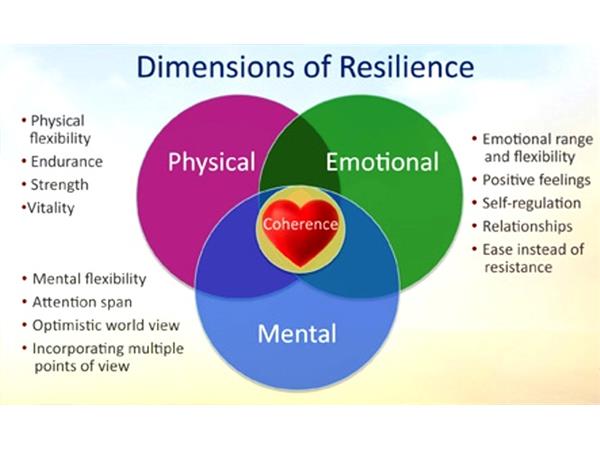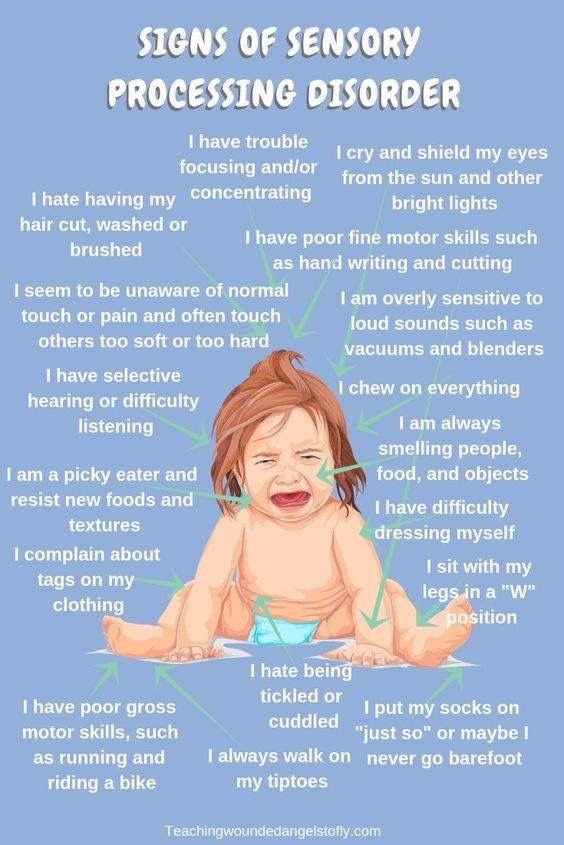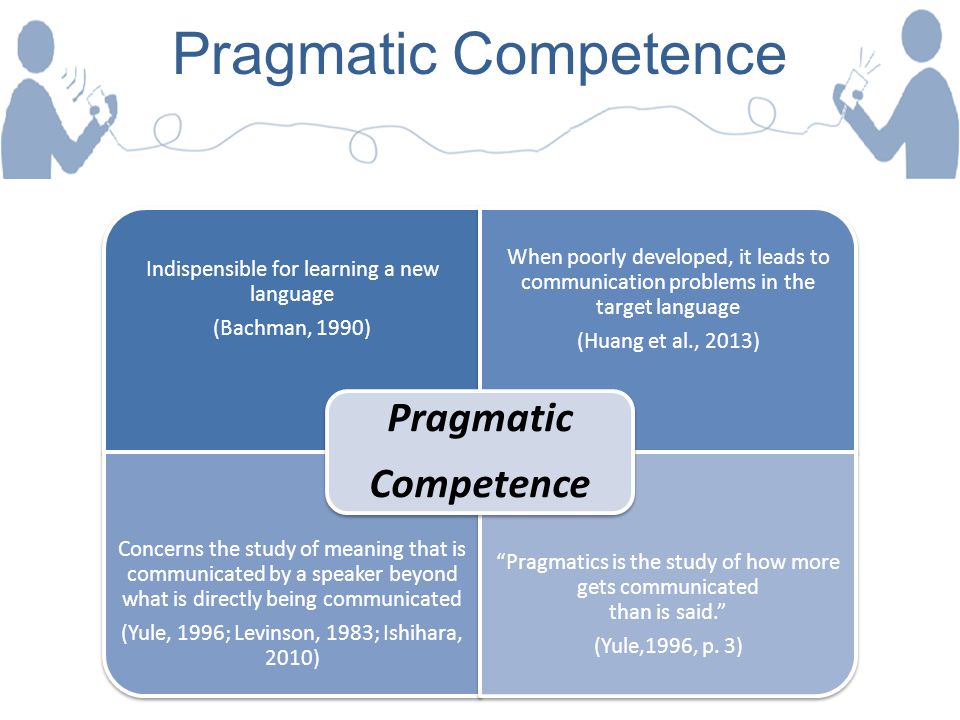Signs and symptoms bulimia
Bulimia Nervosa – Signs, Symptoms & Treatment
Nationwide Children’s Hospital
Overview
Signs & Symptoms
Causes
Diagnosis
Treatment
Complications
Seeking Help
What is Bulimia Nervosa?
An eating disorder is a mental health illness that causes unhealthy eating behaviors.
Bulimia nervosa is one type of eating disorder in which a person regularly eats excessive amounts of food (binge eats) and then attempts to eliminate (purge) the consequences of overeating by vomiting, taking laxatives or diuretics, fasting or exercising excessively. This is often referred to as “binge and purge.
”
Though bulimia is more common in teenage girls and women in their early 20s, all young people are at risk.
Because bulimia is a serious illness that can lead to dangerous, life-threatening health complications, it is very important to take any warning signs or symptoms of the disorder seriously.
What Are The Signs and Symptoms?
It can be hard to tell if a child has bulimia. This is because people with the disorder are often at a healthy weight and binge and purge when family and friends are not around.
However, it may be possible to find signs of a binge and purge episode. Large amounts of food missing from the kitchen, several empty food containers or wrappers found in unexpected places, boxes of laxatives or diuretics, or the smell of vomit are all signs.
A child with bulimia may:
- Disappear after meals.
- Hoard food.
- Skip meals or eat small amounts of food at regular meals.
- Have a distorted body image and low self-esteem.
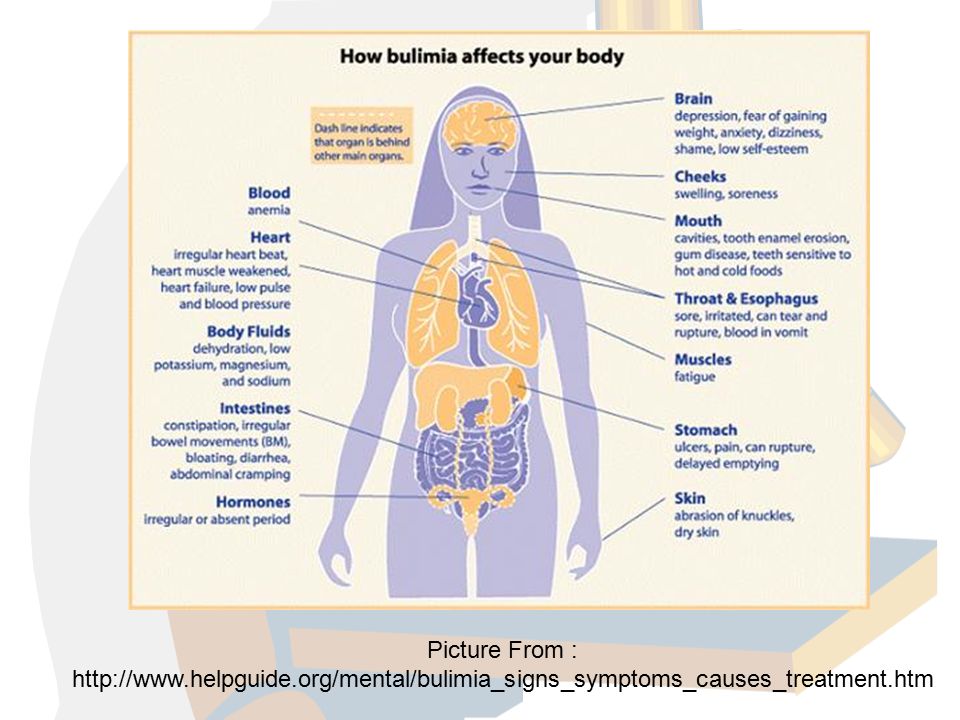
- Exercise excessively.
- Be sad or anxious.
- Withdraw from friends and social activities.
Other signs and symptoms of bulimia include:
- Swollen salivary glands
- Cut or callused knuckles from self-induced vomiting
- Tooth enamel erosion from contact with stomach acid during self-induced vomiting
- Gastrointestinal problems such as stomach cramps, acid reflux and constipation
Substance abuse, impulsivity and self-harm are also common in people with bulimia.
What Causes Bulimia?
Researchers are still studying the causes of bulimia and other eating disorders. It is currently thought that eating disorders might be caused by a combination of biological, genetic, psychological and social factors.
How is Bulimia Diagnosed?
The doctor talks to the child and parent about eating behaviors and other related topics and evaluates the child’s symptoms and medical history.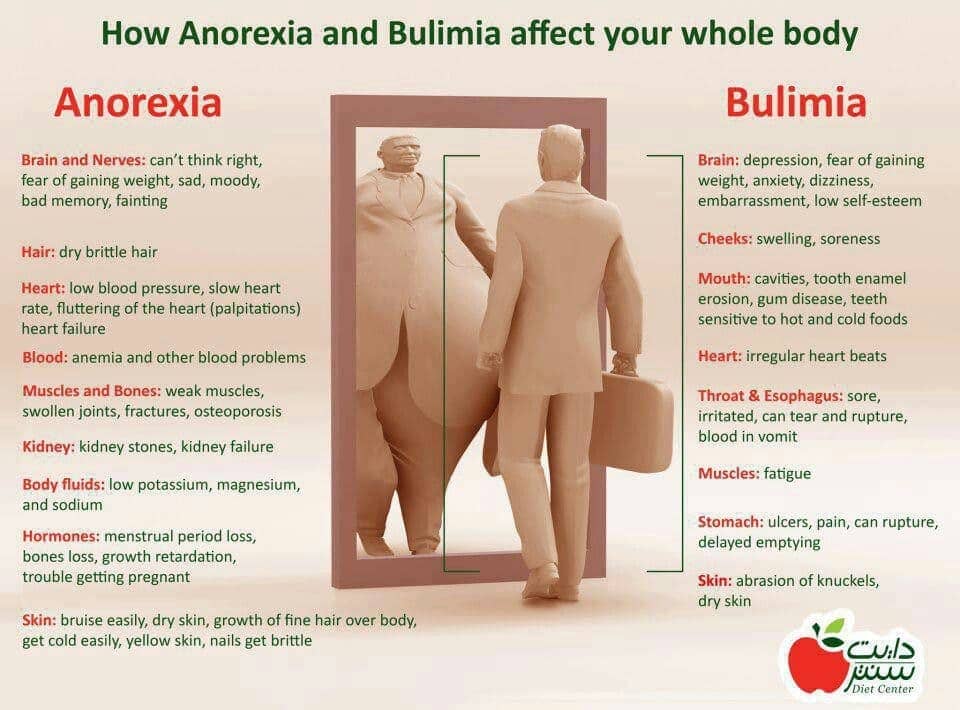 A physical exam and blood and urine tests are also performed to make sure another condition isn’t causing the child’s symptoms.
A physical exam and blood and urine tests are also performed to make sure another condition isn’t causing the child’s symptoms.
In some cases, additional tests are done to check for complications related to bulimia.
How is Bulimia Treated?
Proper treatment for bulimia requires professional help from a multidisciplinary team of specialists. Parents must also educate themselves and play an active role in the treatment process.
Treatment may include:
- Nutrition therapy. A dietitian creates an eating plan to restore healthy eating habits and treat dehydration and electrolyte imbalance.
- Counseling. A therapist or psychiatrist who specializes in eating disorders talks to the child about his or her thoughts and feelings in an effort to change the child’s behavior. Counseling may take place with the child’s parent there or one-on-one.
- Medicine. A psychiatrist may prescribe an antidepressant if the child is also diagnosed with depression or anxiety.
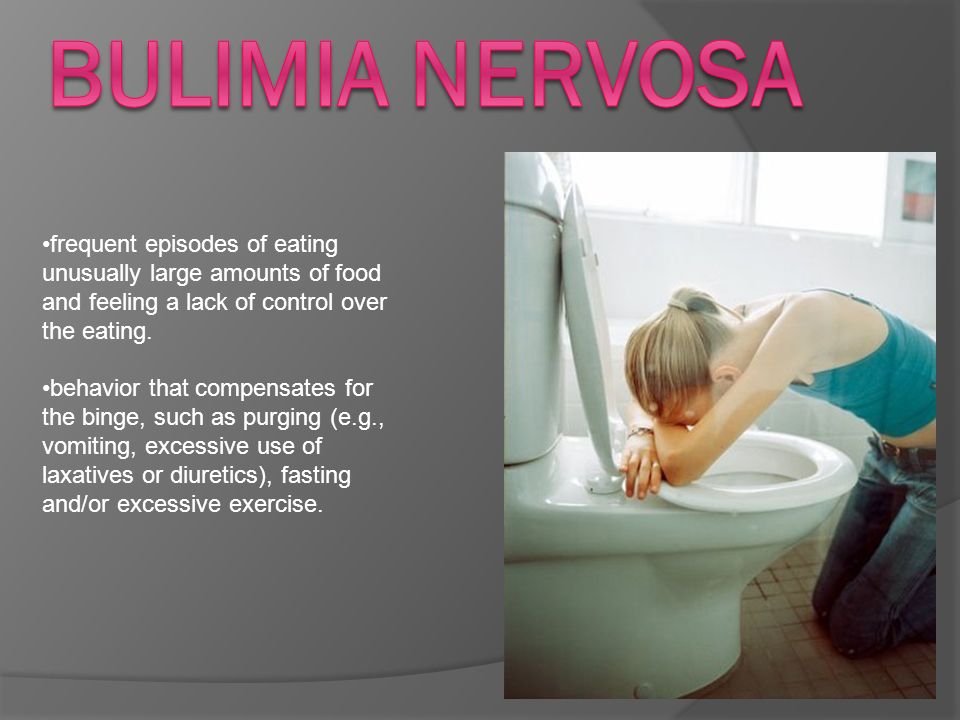
- Hospitalization. Severe complications of bulimia may require hospitalization.
Recovery from an eating disorder takes time and full support from loved ones. Relapse is possible. But with love and thoughtful guidance from parents, a child can recover.
Are There Any Complications Associated With Bulimia?
Potential health complications of bulimia include:
- Loss of menstrual period (amenorrhea) and infertility in girls
- Severe dehydration, which can lead to seizures or kidney failure
- Electrolyte imbalance, which can lead to irregular heartbeat, heart failure, stroke or seizures
- Stomach damage
- Esophagus damage
- Insulin resistance, which can cause Type 2 diabetes
Many of the complications of bulimia can become life-threatening if left untreated. The mental and emotional factors related to bulimia can also lead to suicide.
When Should You Seek Help For Your Child?
Bulimia is easier to treat before it causes severe health problems.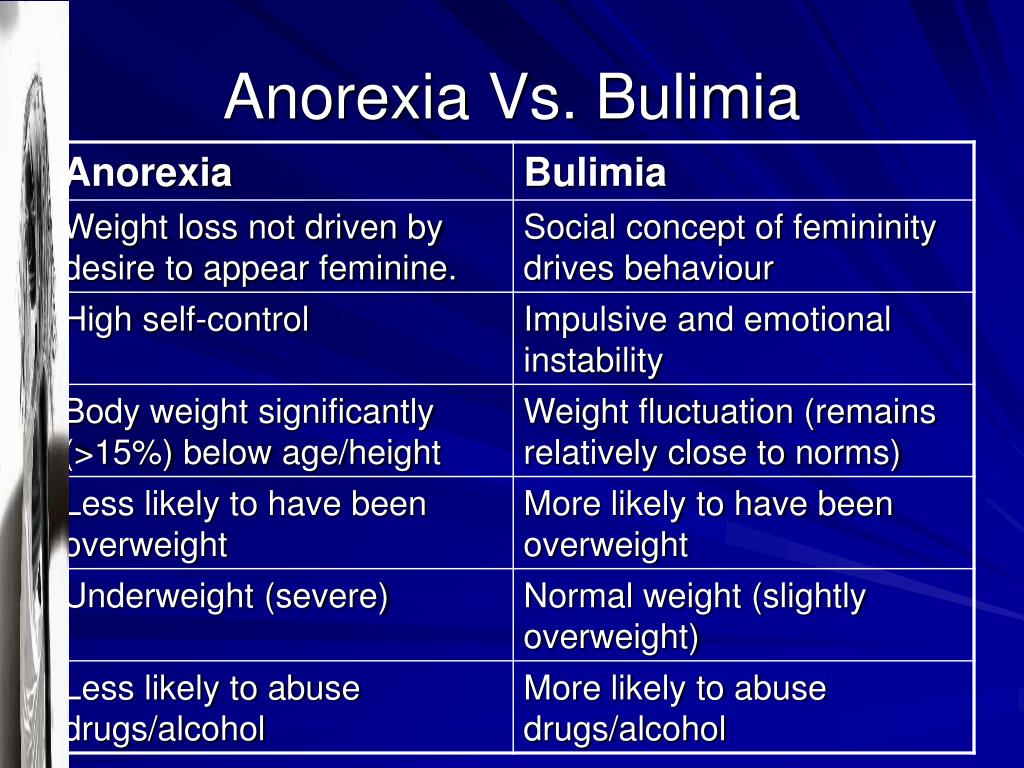 Don’t ignore the signs and symptoms.
Don’t ignore the signs and symptoms.
If you find signs of binging and purging coupled with other signs and symptoms of bulimia, make an appointment with your family doctor or pediatrician to discuss your concerns.
You May Also Be Interested In
Podcast
PediaCast 249: Eating Disorders
Dr. Mike and Dr. Terrill Bravender have a detailed discussion on eating disorders. From risk factors and symptoms to diagnosis and treatment, they cover everything you need to know about anorexia nervosa, bulimia, and binge eating.
Condition
Anorexia Nervosa
Anorexia nervosa is a type of eating disorder in which a person severely limits the amount of food he or she eats to prevent weight gain or lose weight.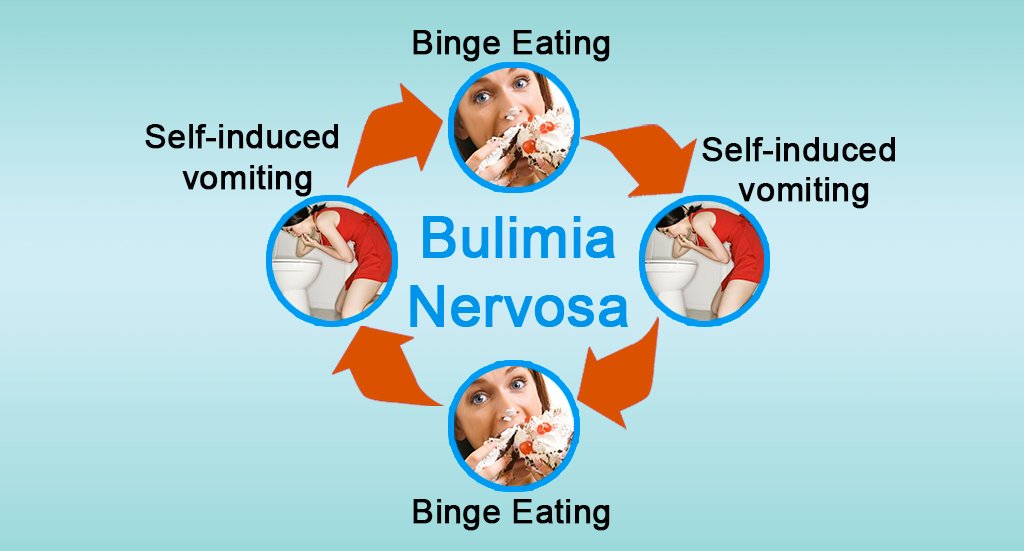
Specialty
Eating Disorders Program
We work with each child and family to help him or her eat right and stay medically stable. Our team talks to your child about issues that may lead to disordered eating, along with other medical or psychiatric concerns.
8 Warning Signs of Bulimia Nervosa
Skip to contentDid you know bulimia is more common than anorexia? Or that excessive exercise is a common symptom of bulimia?
Bulimia impacts millions of Americans – estimates show a lifetime prevalence of 1.5% among all females and 0.5% of males. Like other eating disorders, bulimia is a serious condition and can result in severe medical and behavioral complications.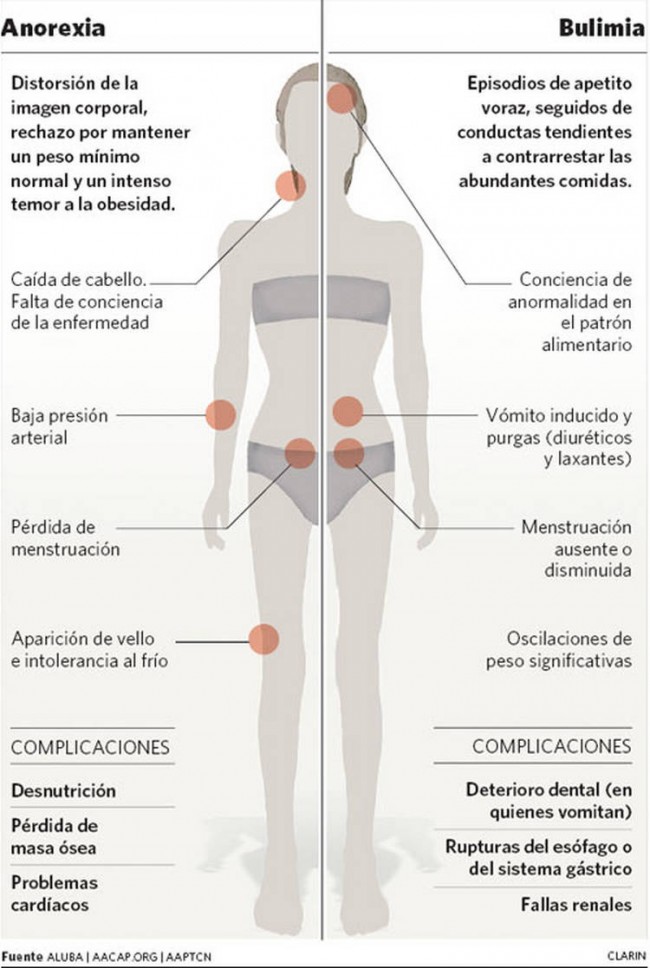
Recognizing the proper signs and symptoms of bulimia can help to mitigate these health risks, but due to the secretive nature of this disorder, can often be challenging. Furthermore, bulimia affects individuals of all body shapes and sizes – not just those who live in larger or smaller bodies.
Despite this, there are some warning signs that are important to be aware of. Let’s take a look:
Eating large quantities of food, followed by some type of compensatory behavior: Individuals with bulimia consume larger portions of food than what is considered normal over short periods of time, often lacking control and the ability to stop and even sometimes eating to or past the point of discomfort. Strong feelings of shame and guilt typically follow the binge eating episode, which then lead to compensatory behaviors aimed at “undoing” calories consumed. These can include self-induced vomiting, abuse of laxatives, diuretics and/or diet pills, fasting or over-exercise (see below for more).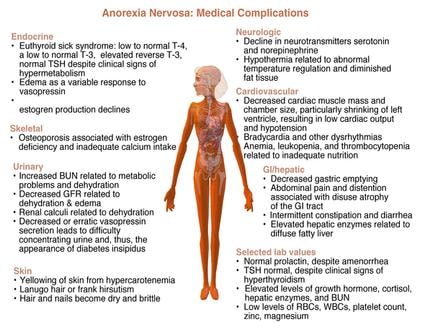
Dehydration or weakness: Self-induced vomiting and laxative abuse can deprive individuals of adequate potassium and calcium, which can then result in severe electrolyte imbalances and dehydration. In those cases, individuals might frequently experience lightheadedness, lethargy, muscle weakness and/or severe cardiac irregularities.
Unusual behavior around meals: Consistently disappearing following a meal, especially to the bathroom, can be a sign indicative of bulimia. The same can be said for finding open wrappers or stashes of food in unusual places; for instance, opened packs of candy bars underneath one’s bed or in their closet. Excessive fluid intake after eating, especially water or diet soda, can be a precursor to certain purging behavior. Regularly eating alone in private or showering immediately following meals are also possible causes for concern.
Intense fear of gaining weight: Individuals with bulimia commonly express strong dissatisfaction with their body type or appearance. If you notice yourself or someone you love talking more about dieting, food, shape and appearance, it might be worth paying more attention to.
If you notice yourself or someone you love talking more about dieting, food, shape and appearance, it might be worth paying more attention to.
Dental issues: This is common among those who partake in self-induced vomiting. Frequent vomiting builds up acid levels in the mouth which, over time, can lead to tooth decay, erosion, discoloration and even loss of teeth.
Scars on fingers or knuckles: This mostly applies to individuals who use self-induced vomiting as a compensatory behavior. Repeated instances of purging can cause irritation, calluses or scars on one’s knuckles or on the back of their hands (also called Russell’s Sign).
Social withdrawal: Binge episodes and subsequent compensatory behaviors can be used as coping mechanisms to deal with overwhelming feelings of stress, anxiety and even depression. Someone with bulimia might isolate in order to avoid social situations, especially those involving food or meals.
Over-exercise: Not everyone who over-exercises has bulimia.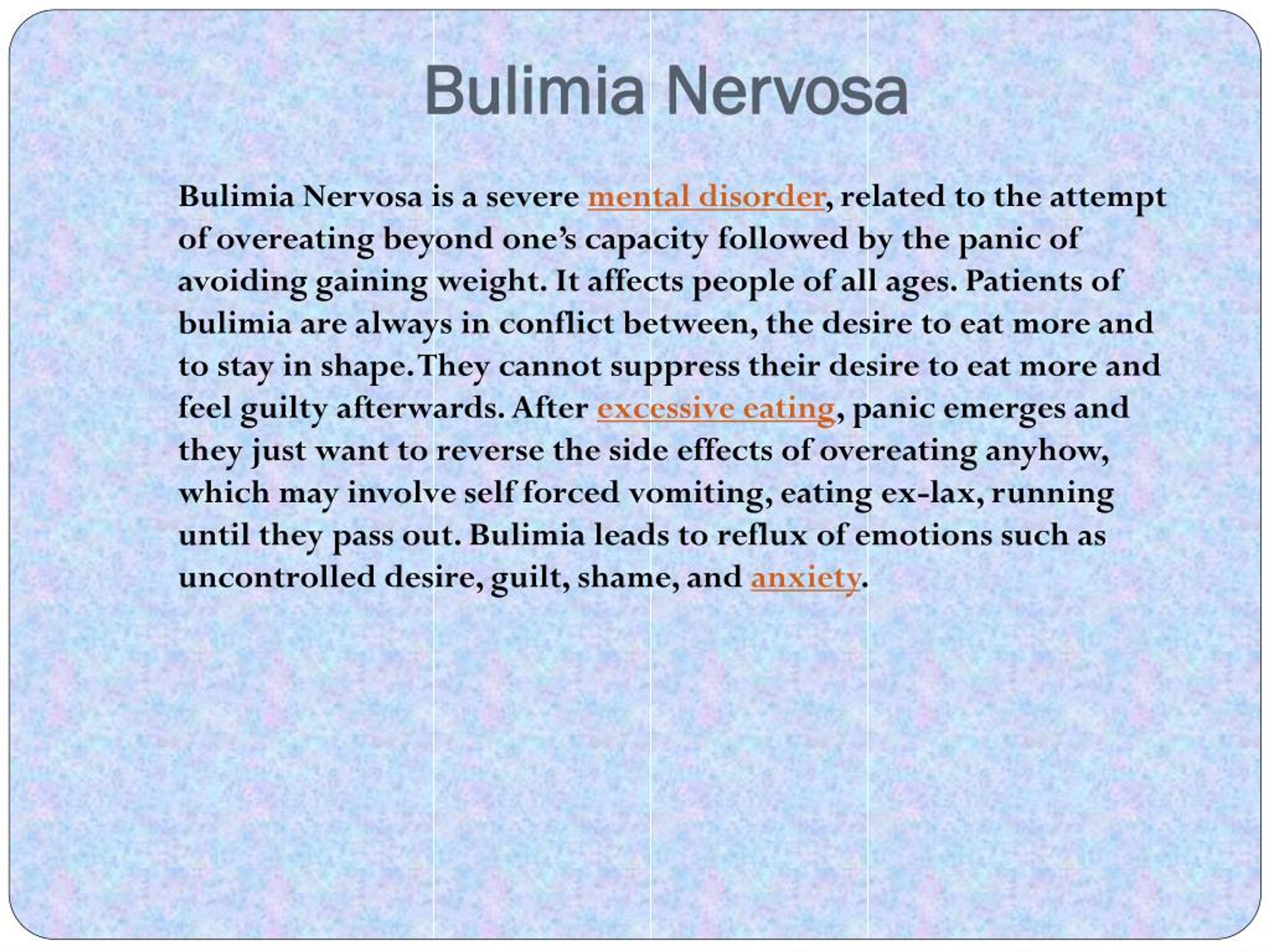 But “exercise bulimia” is a real thing, occurring when someone uses exercise as a means to compensate for caloric intake. This form of bulimia is becoming increasingly common in males. A warning sign to look for here is the inability for a person to take a day off even if they are injured or ill.
But “exercise bulimia” is a real thing, occurring when someone uses exercise as a means to compensate for caloric intake. This form of bulimia is becoming increasingly common in males. A warning sign to look for here is the inability for a person to take a day off even if they are injured or ill.
If you – or someone you know – are experiencing some of the symptoms above, it could be a sign of a more serious issue. Consulting a medical professional or a trained eating disorder specialist is recommended.
Of course, our team is always happy to be a resource for you, too.
Let’s Connect
Notice: JavaScript is required for this content.
Bulimia - Hadassah Medical Moscow
Bulimia is a mental disorder characterized by eating disorders. It manifests itself in the form of frequent bouts of overeating, during which a person does not feel either the taste of food or satiety. After such a breakdown, a feeling of repentance comes, a person tries to cleanse the body of excess. To do this, he induces vomiting, takes laxatives,
After such a breakdown, a feeling of repentance comes, a person tries to cleanse the body of excess. To do this, he induces vomiting, takes laxatives,
uses enemas. If you notice such tendencies in yourself, you should immediately consult a doctor. Lack of timely treatment leads to serious violations in the work of all organs and systems. Deaths are also possible.
Full text
Symptoms of bulimia
Bulimia is a disease in which eating behavior changes. She has a pronounced psychosomatics, so it is not difficult to identify the disease. The most obvious symptoms of bulimia are:
- Frequent overeating, fast eating;
- Poor chewing;
- Need to go to the toilet immediately after eating to induce vomiting;
- Secrecy, isolation;
- Constant feeling of hunger;
- Frequent changes in body weight;
- General weakness, fatigue.
Bulimia always leads to disorders of organs and systems. A person with this pathology develops endocrine pathologies, inflammation occurs in the gastrointestinal tract, the salivary glands hypertrophy, and the condition of the teeth deteriorates. Bulimia can also be recognized by damage to the fingers, convulsive syndrome, diarrhea, menstrual irregularities.
A person with this pathology develops endocrine pathologies, inflammation occurs in the gastrointestinal tract, the salivary glands hypertrophy, and the condition of the teeth deteriorates. Bulimia can also be recognized by damage to the fingers, convulsive syndrome, diarrhea, menstrual irregularities.
Make an appointment
Leave your number, our operator will answer all your questions in detail
By clicking on the button, you agree to the rules for the use and processing of personal data for many reasons. Both external and internal factors can contribute to its development. Most often, bulimia occurs due to the following reasons:
- Somatic diseases. The cause of constant hunger and uncontrolled gluttony can be brain pathologies in which the frontal lobes of the cortex or the food center are damaged. Often bulimia occurs in patients with diabetes mellitus, insulin resistance, hyperthyroidism;
- Emotional-personal phenomena. Bulimia is mainly found in people with low self-esteem, increased responsibility, instability.
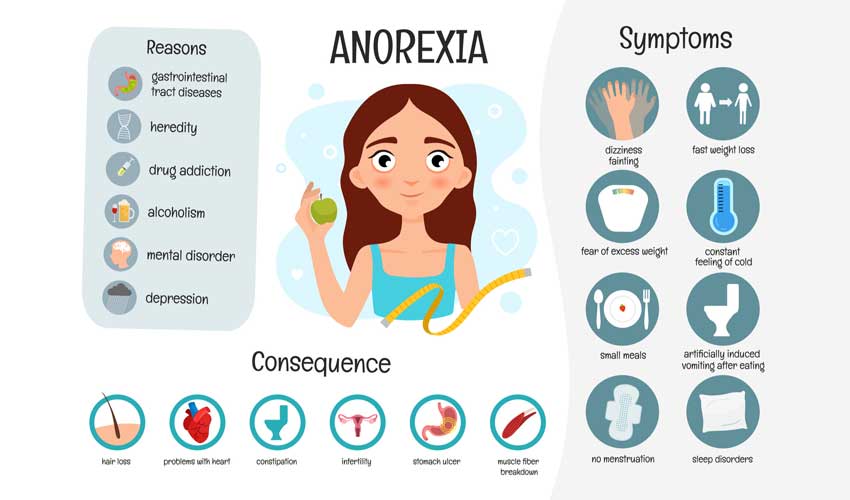 Such patients are prone to affective actions, suffer from feelings of guilt;
Such patients are prone to affective actions, suffer from feelings of guilt; - Habits and upbringing. Often, bulimia affects people who faced hunger in childhood, quickly plunged into adulthood. For this reason, children should not be forced to finish eating a portion if a feeling of fullness has already appeared;
- Stress. Many people suppress stress with food - they eat trouble. Therefore, bulimia is often found in those who do not tolerate stressful situations.
Bulimia is a polyetiological disease. Risk factors include young age, a history of sexual abuse, affective lability, unstable self-esteem, and preoccupation with being overweight.
Methods for diagnosing bulimia
A psychiatrist deals with the diagnosis of bulimia. He needs to collect a detailed history: interview the patient, determine his eating habits, possible causes of deviation. Further carried out:
General and biochemical blood test
Blood test for hormones
Ultrasound examination of the abdomen, thyroid gland
CT scan of the brain
Electrocardiography
Treatment methods for bulimia
With timely treatment, bulimia can be stopped.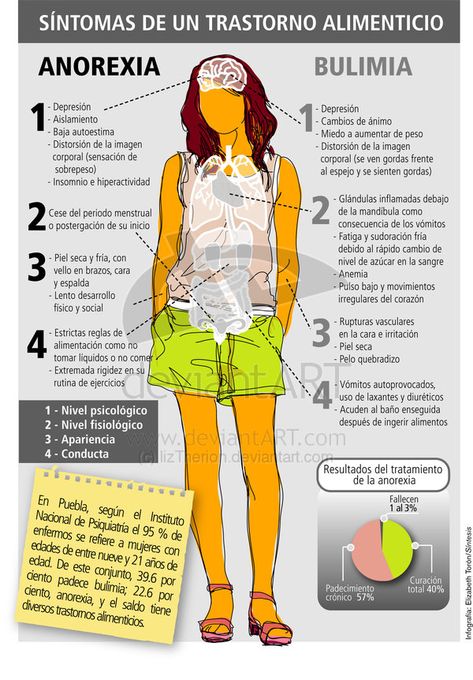 However, the therapy should be complex, it involves a psychiatrist, psychotherapist, nutritionist and other specialists, if necessary (dentist, gastroenterologist, endocrinologist, cardiologist). Bulimia is treated on an outpatient basis, usually using the following methods:
However, the therapy should be complex, it involves a psychiatrist, psychotherapist, nutritionist and other specialists, if necessary (dentist, gastroenterologist, endocrinologist, cardiologist). Bulimia is treated on an outpatient basis, usually using the following methods:
- Behavioral therapy. It is necessary to increase the patient's motivation for adequate nutrition, reduce anxiety, eliminate complexes and the desire to overeat;
- Interpersonal correction. The causes of personal problems are revealed and the method of their solution is determined. It is necessary to carry out social adaptation of the patient.
- Taking medications. Drug therapy for bulimia consists of taking selective serotonin reuptake inhibitors, which act as antidepressants. If necessary, hormonal drugs, drugs to restore the gastrointestinal tract can be prescribed.
Prevention and treatment programs for bulimia at the Hadassah Clinic
On average, bulimia treatment takes 4-8 months. With an integrated approach, the probability of a positive outcome is 80%. The patient needs to get rid of pathological eating habits, adopt the rules of a healthy diet. To prevent the development of bulimia, remember the preventive measures:
With an integrated approach, the probability of a positive outcome is 80%. The patient needs to get rid of pathological eating habits, adopt the rules of a healthy diet. To prevent the development of bulimia, remember the preventive measures:
- Monitor the psychological situation in the family;
- Protect yourself from stress, conflict situations;
- Seek help from a psychotherapist or nutritionist if necessary;
- Don't starve, eat right;
- Go in for sports;
- Give up bad habits.
If you experience bulimia, be sure to contact your doctor. Any delay can lead to multiple complications. Doctors from the Hadassah clinic in Moscow will help cure this disease.
#DrunkOP
Drunk
Olga Pavlovna
Endocrinologist, dietitian, Ph.D.
Work experience: 11 years
Published: 05/12/2020
Updated: 05/14/2021
Checked: 06/20/2022
All doctors of the department
3
0
Korobkina
Anna Sergeevna
Nephrologist, nutritionist
Work experience: 14 years
Cost of admission: from 6000 ₽
Make an appointment
Zavarzina
Natalya Pavlovna
Gastroenterologist-nutritionist
Work experience: 14 years
Appointment fee: from 6000 ₽
Make an appointment
Drunk
Olga Pavlovna
Endocrinologist, dietitian, Ph.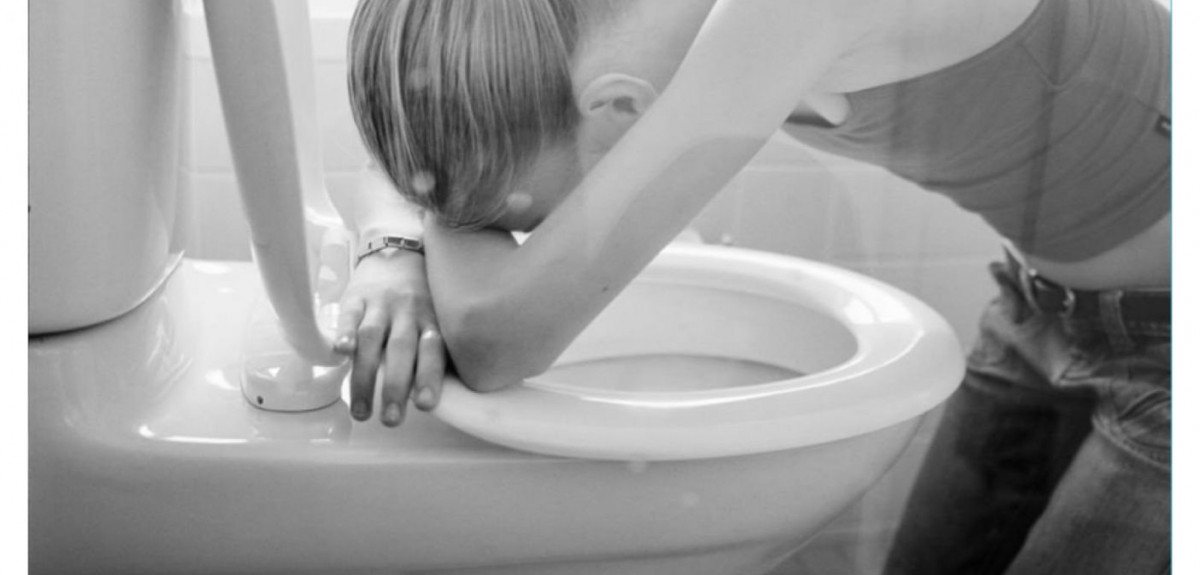 D.
D.
Work experience: 11 years
Cost of admission: from 8000 ₽
Make an appointment
All doctors
Prices for nutrition services
02 By clicking on the button, you agree to the rules for the use and processing of personal data
signs, symptoms, causes, diagnosis and treatment of the disease
Font size Color scheme Images
x
Make an appointment
Name* Phone* Adult Child (under 18)x
Sign up for analysis
Name* Telephone*☆ st. Malaya Balkanskaya, 23 (m. Kupchino)
Dunaisky ave., 47 (m. Dunaiskaya)
Udarnikov ave., 19 (m. Ladozhskaya)
st. Marshala Zakharova, 20 (metro station Leninskiy pr-t)
Vyborgskoe shosse, 17 (metro Prospect of Enlightenment)
- Call
435 55 55 -
Make an appointment
This disease is treated by a Psychotherapist
The information provided on this page should not be used for self-treatment or self-diagnosis.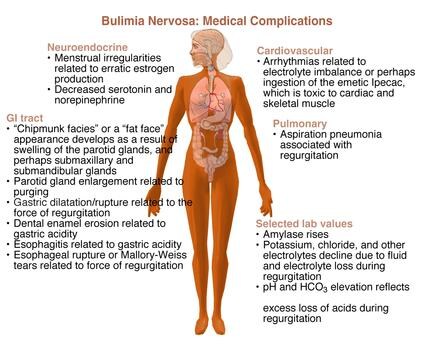 If you suspect a disease, you should seek help from a qualified specialist. Only your doctor can diagnose and prescribe treatment.
If you suspect a disease, you should seek help from a qualified specialist. Only your doctor can diagnose and prescribe treatment.
- Causes
- Symptoms of bulimia
- Classification
- Diagnostics
- Treatment of bulimia
- Prophylaxis
What is bulimia?
Bulimia is an eating disorder. The main signs of bulimia are bouts of uncontrolled consumption of large amounts of food, followed by emptying of the stomach by artificial induction of vomiting.
The patient constantly overeats, after which he begins to feel guilty and tries to quickly cleanse the body in various ways (enemas, inducing vomiting, taking diuretics and laxatives). To reduce weight, people begin to torture themselves with heavy physical exertion and go on strict diets.
Most often, the disease occurs in young girls aged 15-24 years, whose weight is in the normal range or slightly higher.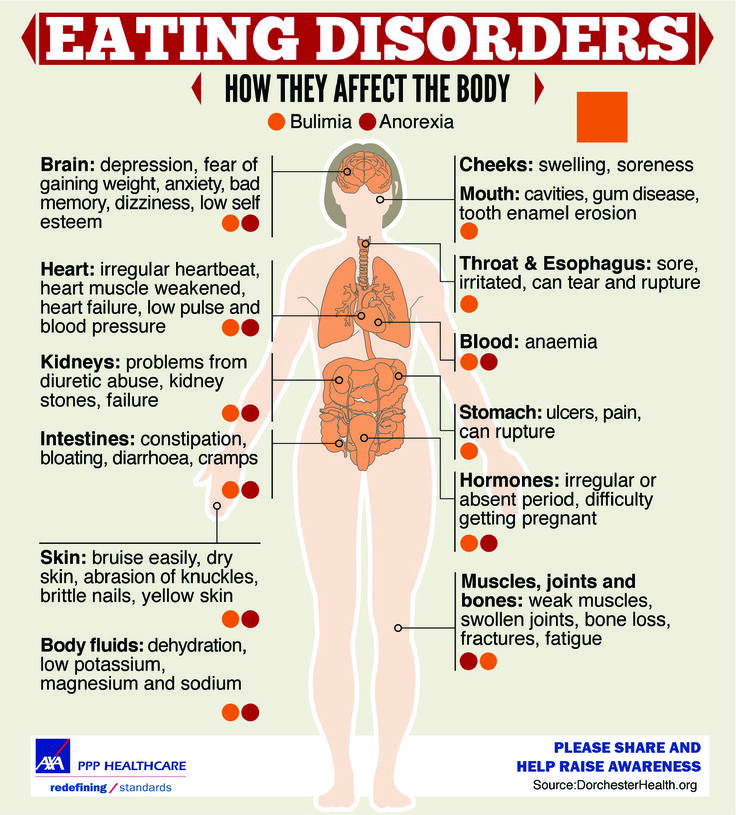 Most patients are associated with areas that require weight control (gymnasts, runners, dancers, models).
Most patients are associated with areas that require weight control (gymnasts, runners, dancers, models).
The diagnosis is made by a psychotherapist by interviewing and examining the patient, using psychodiagnostic questionnaires.
How to cure bulimia? The therapy of the disease is complex and includes diet therapy, antidepressants, psychotherapy Source:
Anorexia and bulimia nervosa: from history to the present. Barylnik Yu.B., Filippova N.V., Deeva M.A. Guseva M.A. Russian Psychiatric Journal No. 3, 2016. p. 36-45.
Causes
This mental disorder usually develops under the influence of social factors, which include:
- imposition of artificial beauty standards on the Internet, on television, in advertising;
- interpersonal contacts;
- excessive self-criticism resulting from the negative influence of someone from close people;
- low self-esteem, self-doubt;
- desire for ideal forms, excessive pedantry.

Bulimia nervosa is especially prevalent in the EU and the USA, where the fashion industry is well developed and the population is highly exposed to advertising, TV and the Internet. In recent decades, bulimia is increasingly common in Russia.
But in the countries of Latin America or India, where beauty standards are different and "girls in the body" are valued, the number of patients with bulimia is extremely small.
There are a number of other factors that can trigger the development of the disease:
- hereditary predisposition;
- lack of serotonin in the body;
- depression;
- chronic stress;
- increased anxiety Source:
Modern ideas of young people about eating disorders (bulimia). E. M. Solodovnik, L. A. Nepovinnykh. International Journal of Humanities and Natural Sciences №42, 2020. p. 159-163.
Symptoms of bulimia
The main signs of the disease are:
- constant weight control, perception of oneself as a fat person, although in reality it is not, fear of gaining weight;
- uncontrollable, obsessive desire to eat;
- constant overeating - it happens objective when the patient really eats too much food at a time, and subjective when little food is eaten, but the person thinks that he overeats, the frequency of such episodes in bulimia is at least twice a week in for three months or more, after eating, the patient feels guilt, despair, anger;
- getting rid of food eaten artificially to avoid weight gain (taking appetite suppressants, laxatives, inducing vomiting, cleansing enemas).
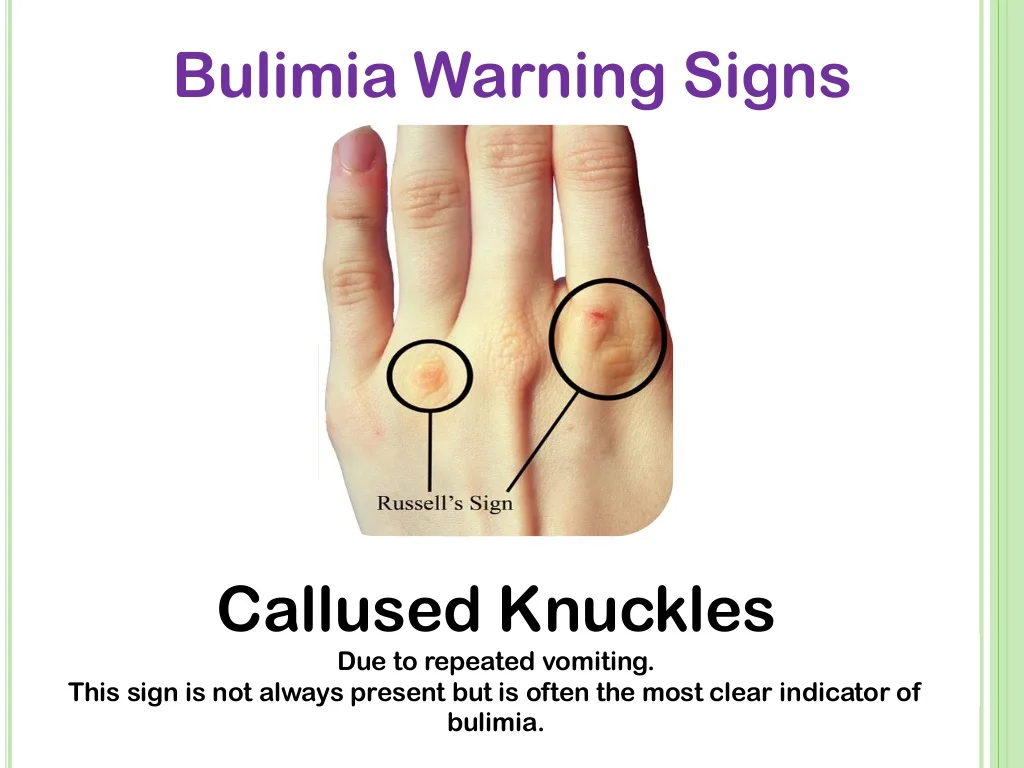
To confirm the diagnosis of bulimia , the patient must have all 4 of the above symptoms. The diagnosis is made by a psychiatrist after examination and detailed questioning of the patient.
In addition to the above signs, a person with bulimia feels loneliness, helplessness in front of his problem, he develops depression. As a result, in search of support, many people, instead of contacting a specialist, find thematic communities about bulimia and anorexia on the Internet and try to solve their problems on their own, which rarely gives a result. If bulimia is started, then over time this leads to metabolic disorders and the development of diseases of internal organs Source:
Overeating as a way to regulate the emotional sphere of people with cleansing bulimia nervosa syndrome. Svitkevich Yu.V. North Caucasian Psychological Bulletin No. 1, 2021. p. 5-20.
Classification
There are two types of bulimia:
- cleansing - after episodes of overeating, the patient tries to get rid of food by causing bouts of vomiting, enemas, laxatives and diuretics;
- uncleaning - less common, in this case the patient tries to compensate for overeating with intense sports, fasting.
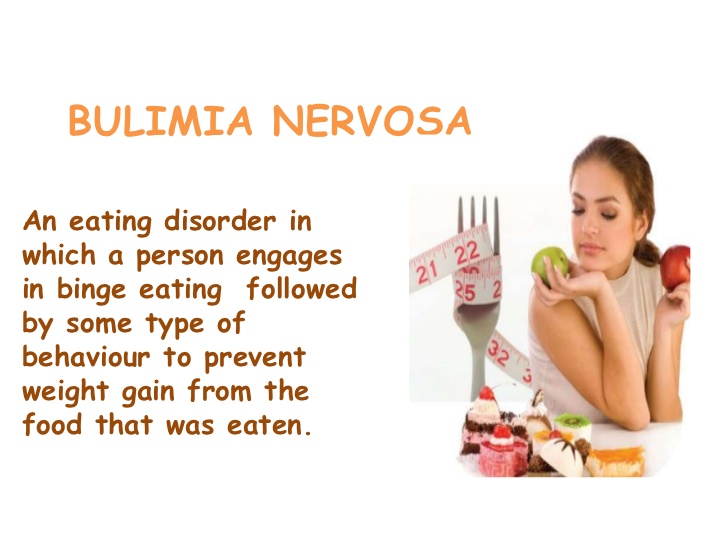
According to the nature of the attacks, three types of disease are distinguished:
- paroxysmal - periods of overeating occur suddenly;
- nocturnal - attacks of gluttony and hunger occur exclusively at night, during the day the appetite is normal or reduced;
- constant - overeating is replaced by body cleansing, after which the patient soon begins to feel hungry again.
Diagnosis
Diagnosis is made by a psychotherapist based on anamnesis, questioning and examination of the patient, results of laboratory and instrumental studies. To determine the degree of metabolic disturbance, a blood test for biochemistry may be prescribed.
If there are indications for diagnosing disorders in the functioning of internal organs, the doctor may prescribe such examinations as ECG, CT, ultrasound and a number of others.
Bulimia treatment
- 1.
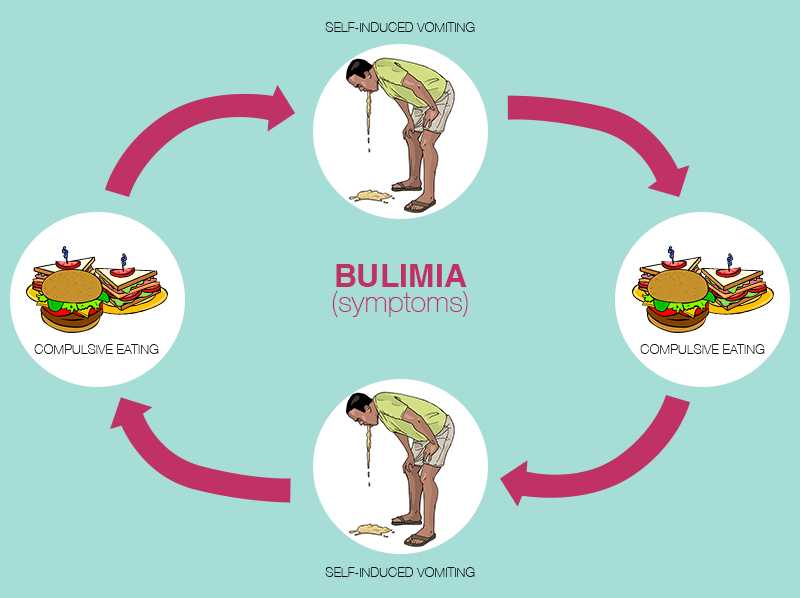 Psychotherapy . Bulimia needs to be treated comprehensively. After all, this pathology leads not only to organic and functional disorders, but also to psychopathological consequences for health. Therefore, for those who are looking for ways to get rid of bulimia on their own, it is better not to waste time and immediately seek help from specialists. The main treatment for bulimia today is cognitive behavioral therapy . In addition, interpersonal therapy and cognitive-emotional therapy show good results. Children and adolescents are treated with systemic family therapy.
Psychotherapy . Bulimia needs to be treated comprehensively. After all, this pathology leads not only to organic and functional disorders, but also to psychopathological consequences for health. Therefore, for those who are looking for ways to get rid of bulimia on their own, it is better not to waste time and immediately seek help from specialists. The main treatment for bulimia today is cognitive behavioral therapy . In addition, interpersonal therapy and cognitive-emotional therapy show good results. Children and adolescents are treated with systemic family therapy. - 2. Medical treatment . To correct this pathological condition, the patient is prescribed antidepressants . This helps to quickly normalize the emotional background, reduce the strength and frequency of seizures, which, in combination with psychotherapy, gives good results. With properly selected treatment and patient compliance with all the recommendations of the attending physician, the prognosis is favorable.

- 3. Food . Patients need to eat varied, wholesome, do not overeat, do not starve, do not go on diets, refuse to take medications for weight loss.
Prevention
To prevent new attacks, the following preventive measures should be observed:
- improve the patient's self-esteem;
- create a healthy psychological environment in the family;
- set a person up for positive thinking;
- create a stable and safe environment Source:
Transactional analysis of bulimia in a passive-aggressive personality. Dmitrieva N.V., Krasovskaya N.R. Medical psychology in Russia No. 6, 2018. pp. 1-16.
It is necessary that the patient is clearly aware of his problems and understands that the struggle with them must continue until complete recovery. The most important preventive measure is the observance of the principles of rational and healthy nutrition.
Patients with a confirmed eating disorder (EDD) need to see a psychotherapist periodically.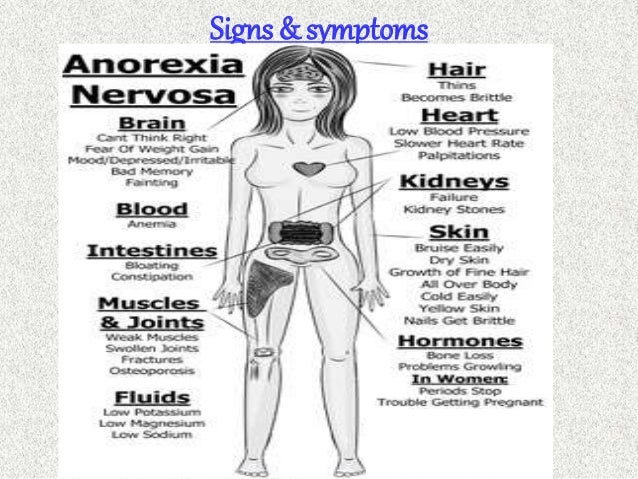 The specialists of our clinic will help to cure the disease and avoid the severe consequences of bulimia.
The specialists of our clinic will help to cure the disease and avoid the severe consequences of bulimia.
You can make an appointment with a doctor right now by calling the indicated numbers or filling out the feedback form on the website.
- Anorexia nervosa and bulimia nervosa: from history to the present. Barylnik Yu.B., Filippova N.V., Deeva M.A. Guseva M.A. Russian Psychiatric Journal No. 3, 2016. p. 36-45
- Young people's current understanding of eating disorders (bulimia). E. M. Solodovnik, L. A. Nepovinnykh. International Journal of Humanities and Natural Sciences №42, 2020. p. 159-163
- Overeating as a way to regulate the emotional sphere of people with purgative bulimia nervosa syndrome. Svitkevich Yu.V. North Caucasian Psychological Bulletin No. 1, 2021. p. 5-20
- Transactional analysis of bulimia in a passive-aggressive personality. Dmitrieva N.V., Krasovskaya N.R. Medical psychology in Russia No.
 6, 2018. p.1-16
6, 2018. p.1-16
Article published on : 10/12/2016
Last updated : 11/06/2022
See also
Panic attacks
Apathy
Anxiety
Licenses
Medicom LLC
(Udarnikov Avenue)
Medicom LLC
(Vyborgskoye Highway)
Medi Len LLC
(Marshal Zakharov St.)
MediProf LLC 901 avenue)
Medi Prof LLC
(Malaya Balkanskaya St.)
Go to the license sectionGo to the legal information section
record from website DISCOUNT 10%
Enrollment is only possible through the contact center.
To register, fill out the form below and you will be contacted.
By clicking on the button, you consent to the processing of your personal data by
You are enrolling:
Clinic: {{department}}
Specialty: {{specialty}}
Doctor: {{doctor}}
Date and time: {{form.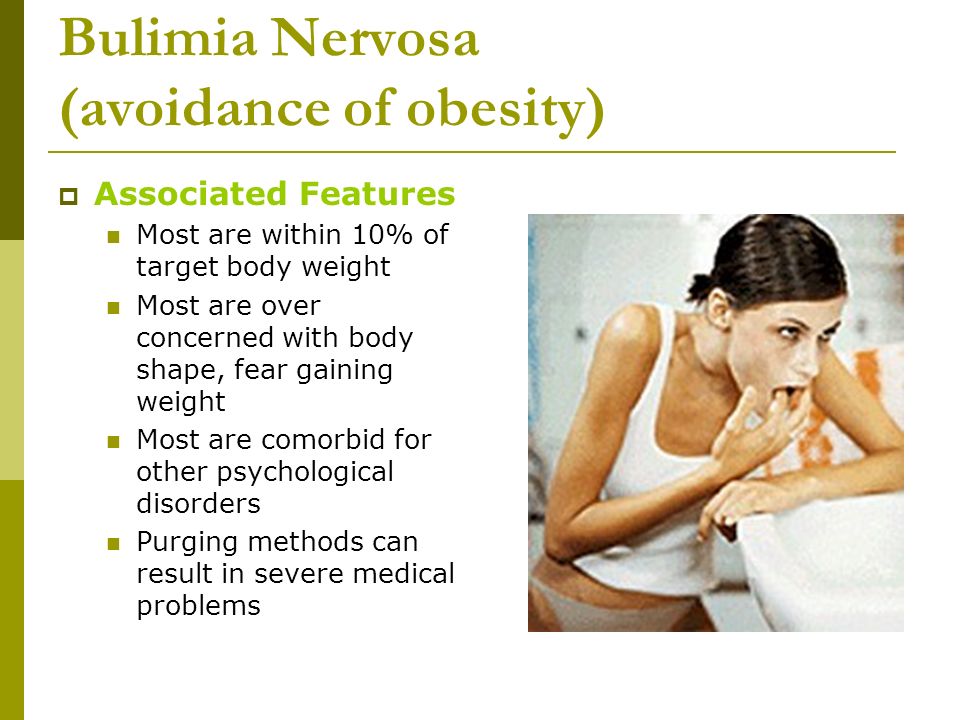 date | setTime(form.time) | dateTimeFormatted}}
date | setTime(form.time) | dateTimeFormatted}}
Date of birth: {{age | dateFormatted}}
{{appointmentReply}}
By clicking "Sign up", I accept the terms of the user agreement, the provisions on the protection of personal data and give my consent to the processing of personal data.
In order to pass the mandatory registration, you must come to the registration desk 10 minutes before your appointment with your passport.
If the patient is a minor (children under 18), it is mandatory to be accompanied by one of the parents with the presentation of his passport and birth certificate of the child.
Relatives and third parties accompanying a minor must have a notarized consent of the parents or legal representatives.
If you have booked an appointment with a coloproctologist, please read the information about preparing for an appointment
The price of the consultation includes:
History taking, preliminary diagnosis and examination appointment.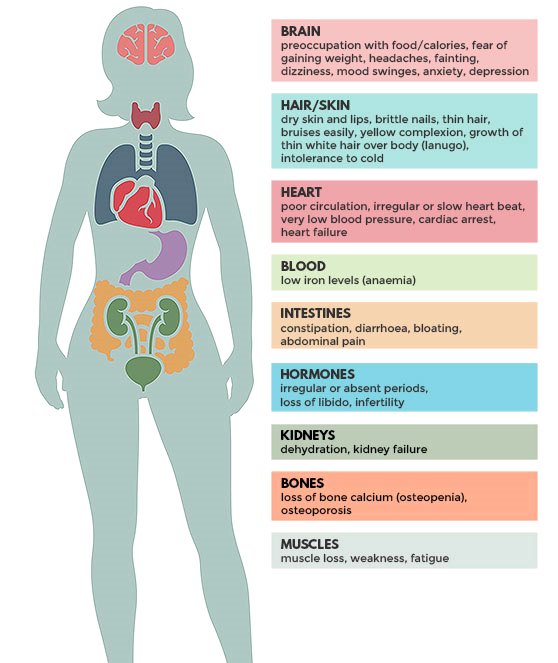 All additional doctor's manipulations at the appointment are paid according to the price list.
All additional doctor's manipulations at the appointment are paid according to the price list.
If you change your mind, please unsubscribe from the appointment by phone +7 (812) 435-55-55
The price of the consultation includes:
History taking, preliminary diagnosis and examination appointment. All additional doctor's manipulations at the appointment are paid according to the price list.
If you change your mind, please unsubscribe from the appointment using your Personal Account or by phone +7 (812) 435-55-55.
Are you sure you want to stop recording?
If you have any questions, call us at +7 (812) 435-55-55
Are you sure you want to change the current entry?
If you have any questions, call us at +7 (812) 435-55-55
You are subject to some restrictions on online booking.
Appointment possible via contact center.
You can sign up by phone +7 (812) 435-55-55
The specialist does not see patients of the specified age. To register please fill out the form below and you will be contacted.
To register please fill out the form below and you will be contacted.
Make an appointment
Would you like us to call you
?
Name Telephone
By clicking on the button, you consent
to process their personal data
You will be contacted to confirm your application.
Making an appointment
Preliminary appointment through the site
Our employee will contact you to confirm the appointment with a specialist
By clicking on the button, you consent to the processing of your personal data by
Learn more about quality assurance of medical services
Would you like us to call you
?
By clicking on the button, you consent to the processing of your personal data by
Leave a request and our specialist
will select a convenient time for a communication session with a doctor
By clicking on the button, you consent to the processing of your personal data by
Get a coupon for a return visit
Screenshot of a review from Yandex.


